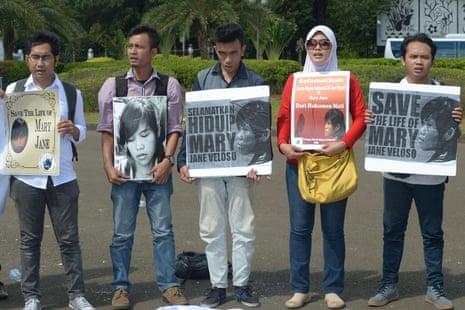Last-ditch diplomatic efforts to spare some of the eight foreign nationals scheduled to face a firing squad in Indonesia for drug offences have intensified as the end of a 72-hour notice period looms.
Along with Indonesian Zainul Abidin, four Nigerians, two Australians, a Brazilian and a Philippines citizen could be executed as early as midnight on Tuesday local time.
They include Australians Andrew Chan and Myuran Sukumaran, for their part in the plot to smuggle 8.3kg of heroin from Bali in 2005. Amnesty International has called on Joko Widodo, the Indonesian president, to grant all nine drug offenders clemency.
In a letter signed by 13 directors of the group from around the world, they acknowledge Indonesia’s need to punish and deter criminal acts, but argue that there is no evidence the death penalty is effective.
Hopes were raised that 30-year-old Filipina Mary Jane Veloso could be spared following lobbying by her country’s president, Benigno Aquino, on the sidelines of the Asean summit in Kuala Lumpur.
Veloso was visited by her two sons, aged six and 12.
“She tried to explain again [to them], ‘If Mumma does not go home, just think Mumma is in heaven,’” Veloso’s elder sister Marites Veloso-Laurente told AFP.
A statement on Monday from Widodo indicated he was sympathetic to her case and would consult with Indonesia’s attorney general before “resum[ing] the conversation” with Aquino. The attorney general, however, said the execution would go ahead, Reuters reported.
Veloso’s supporters, who have held rallies in the Filipino capital, Manila, claim she was unaware her suitcase contained about 2.6kg of heroin when she flew into Yogyakarta, Java, in 2010. Filipino boxer and congressman Manny Pacquiao joined the calls to show Veloso clemency.
“I am begging and knocking at your kind heart that your excellency grant executive clemency to her by sparing her life and saving her from execution,” he said in an appeal to Widodo on Sunday.
Relations between Jakarta and Canberra have frayed because of plans to execute Chan and Sukumaran. The Australian prime minister, Tony Abbott, has been trying to speak with Widodo by phone for seven weeks, and wrote a letter to him at the weekend, appealing for mercy.
“This is not in the best interests of Indonesia, let alone in the interests of the young Australians concerned,” Abbott said on Monday.
Widodo brushed aside a last-minute plea for a stay of execution of the two Australians, saying concerns that their trial had been tainted by corruption should have been raised when the case went through the courts nine years ago.
Julie Bishop, the Australian foreign minister, warned on Monday that carrying out the mass execution would “harm Indonesia’s international standing”.
Protesters gathered outside the Indonesian consulate in Sydney on Monday evening. The former Indonesian president Susilo Bambang Yudhyohono has cancelled an address at the University of Western Australia, Perth, citing “sensitive timing”.
Controversy also surrounds the Brazilian on death row, Rodrigo Gularte. His lawyers say he has bipolar disorder and that psychological assessments last year conclude he also has paranoid schizophrenia.
The UN secretary general, Ban Ki-moon, joined the chorus of opposition to the executions on Sunday, asking that Widodo “urgently consider declaring a moratorium on capital punishment in Indonesia, with a view toward abolition”.
French national Serge Atlaoui won a temporary reprieve at the weekend after officials agreed to wait until his legal challenges have been exhausted. The French president, Francois Hollande, has warned of severe “consequences with France and Europe” if Atlaoui is executed.
The Indonesian president has otherwise refused to be swayed by the international pressure, pledging to clear the country’s death row of drug offenders as part of a crackdown on what he calls the “national emergency” of narcotics. Official figures are unreliable, but it is estimated around 41 foreign nationals are on death row in Indonesia for drug crimes.
Six people, including five foreigners, were shot in the first round of executions on 18 January, among them a Dutch and Brazilian citizen. Both countries pulled their ambassadors from Indonesia in retaliation. Brazil has also refused to accept the credentials of the new Indonesian ambassador.
It was revealed on Monday that the Dutch monarch, Willem-Alexander, had appealed to Widodo to spare 52-year-old Dutch national Ang Kiem Soe.

Comments (…)
Sign in or create your Guardian account to join the discussion